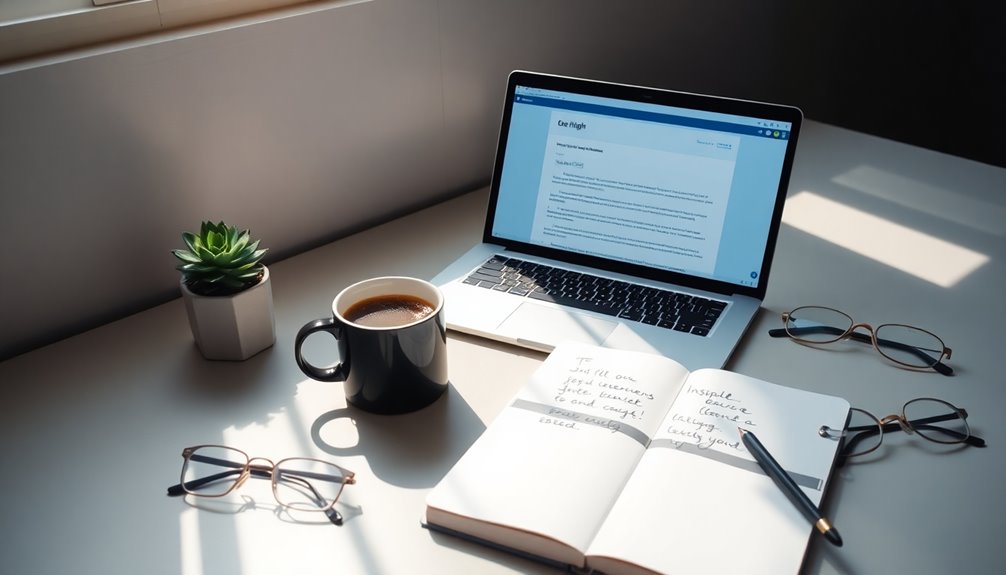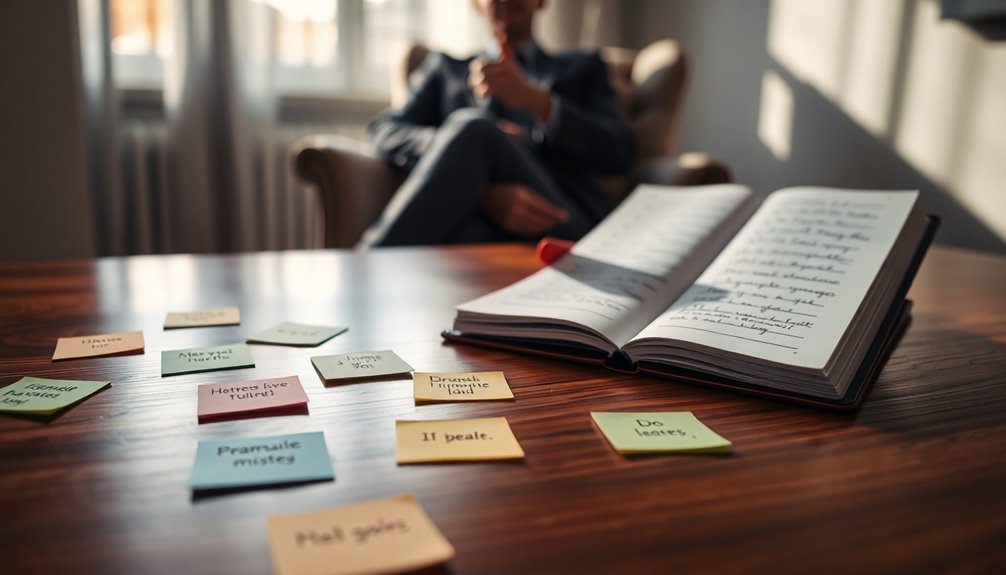Revealing success in final interviews means showcasing your skills and cultural fit effectively. Be ready for key questions about your strengths, weaknesses, and how you handle challenges. Research salary benchmarks, and frame negotiations as collaborative conversations. Remember to communicate clearly and confidently, managing stress by practicing your responses. After the interview, follow up with a thoughtful thank-you note that highlights your interest and key points from your discussion. This proactive approach not only reinforces your candidacy but also positively influences the hiring decision. Want to uncover more strategies to impress in your final interview? Keep exploring your options.
Key Takeaways
- Prepare for key questions by reflecting on past experiences and aligning them with the company's values and needs.
- Research salary standards to confidently negotiate compensation, presenting a range based on market insights.
- Practice active listening during the interview to engage with the interviewer and demonstrate your problem-solving approach.
- Follow up with a thank-you email, reiterating your interest and highlighting how your skills match the role.
- Showcase your long-term potential by discussing how your goals align with the company's vision and culture.
Purpose of the Final Interview
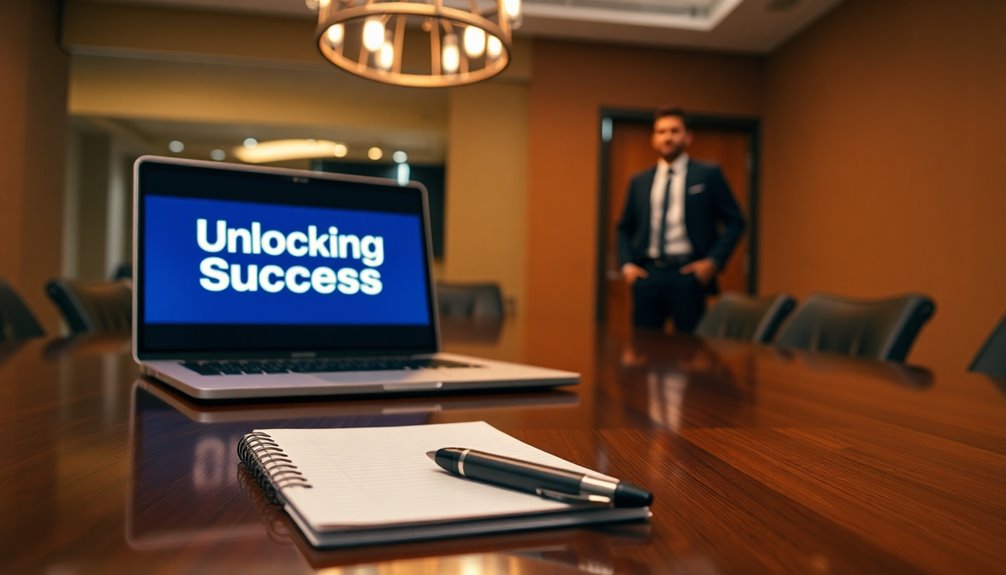
The final interview acts as a pivotal moment in your job search journey, where senior management or HR takes a closer look at your fit for the organization.
This stage goes beyond evaluating your qualifications; it's about building rapport and demonstrating how well you align with the company's culture.
You'll interact with potential colleagues and management, giving you valuable insight into their values and work environment.
It's your chance to showcase not just your skills but also your potential for a long-term professional relationship.
Remember, this interview greatly influences the hiring decision, as it evaluates how well you mesh with the team and the overall organization.
Stay focused, be genuine, and let your personality shine through. Demonstrating strong communication skills during this stage can significantly enhance your chances of making a lasting impression.
Key Questions to Anticipate

Anticipating key questions during the final interview can considerably boost your confidence and performance.
You should prepare for specific inquiries that showcase your compatibility with the role and company culture.
Here are four common questions to expect:
- Can you describe a challenging situation and how you handled it?
- What are your greatest strengths and weaknesses?
- How do you prioritize tasks when under pressure?
- Why do you believe you're the best fit for this position?
Salary Negotiation Strategies

When it comes to salary negotiations, preparation is key. Start by researching industry salary standards for similar roles to understand what you can reasonably expect.
When the topic arises, offer a salary range instead of a fixed number. This shows flexibility while ensuring your minimum acceptable salary is comfortable. Use your market research to back up your expectations, making it clear why you deserve the figure you've proposed.
Remember, negotiations are a conversation, not a confrontation; listen actively and be open to counteroffers. If the initial offer falls short, express your enthusiasm for the role while discussing the value you bring to the team. Additionally, consider how retirement planning can impact your overall compensation package, as it may be a factor in your long-term financial strategy.
This approach sets a positive tone and keeps the dialogue constructive.
Managing Conflict Effectively
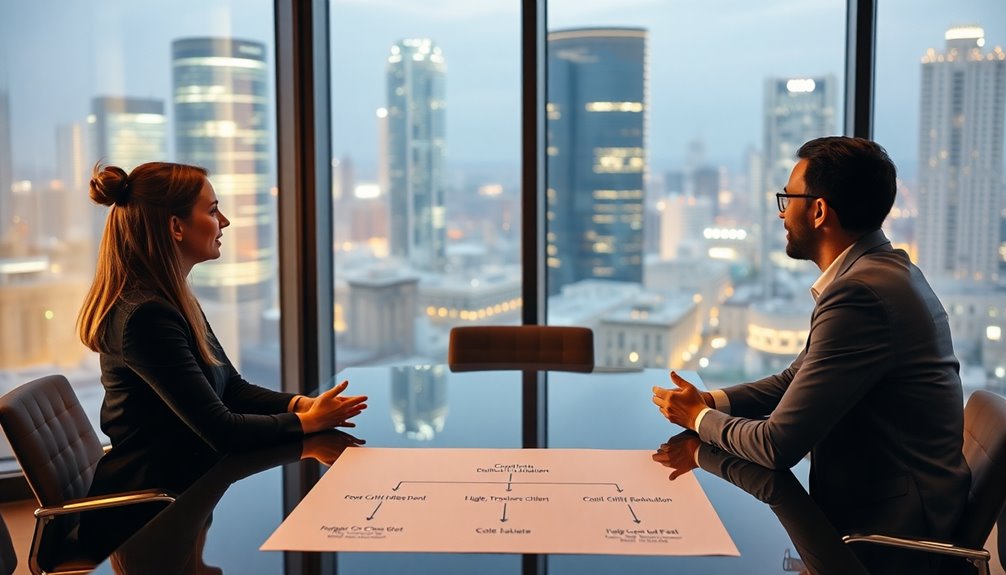
Steering through conflict effectively is essential for maintaining a positive work environment and fostering teamwork.
When you face disagreements, consider these strategies to manage conflict:
- Listen Actively: Pay attention to the other person's perspective without interrupting. This shows respect and helps you understand their feelings.
- Stay Calm: Keep your emotions in check. Responding calmly can de-escalate tensions and lead to constructive dialogue.
- Find Common Ground: Identify shared goals or interests. This can bridge differences and encourage collaboration.
- Propose Solutions: Suggest actionable steps to resolve the conflict, inviting input from others to foster a cooperative atmosphere.
Coping With Stress in Interviews

Managing stress during interviews is essential for showcasing your best self to potential employers. To cope effectively, start by preparing thoroughly. Research the company and practice common questions, so you feel ready.
When anxiety creeps in, use deep breathing techniques to calm your mind. Visualize success before the interview; this positive imagery can boost your confidence.
Remember to stay organized—arrive early, and bring necessary materials to reduce last-minute stress. During the interview, focus on the conversation rather than your nerves; maintain eye contact and listen actively.
If a stress-related question arises, use the STAR method to structure your response. Finally, don't forget to take care of yourself leading up to the interview—get enough sleep and eat well to stay sharp. Additionally, consider implementing a retirement savings plan to alleviate financial worries, allowing you to concentrate better on your interview performance.
Communicating Clearly and Confidently

Effective communication is key to making a strong impression during your final interview. You want to guarantee your thoughts are articulated clearly and confidently. Here are some strategies to help you shine:
- Be Concise: Stick to the point without rambling; it shows you respect their time.
- Use Positive Body Language: Maintain eye contact and sit up straight to convey confidence.
- Practice Active Listening: Show engagement by nodding and summarizing questions before answering.
- Eliminate Filler Words: Replace "um" and "like" with pauses; they can detract from your message.
Importance of Follow-Up Communication
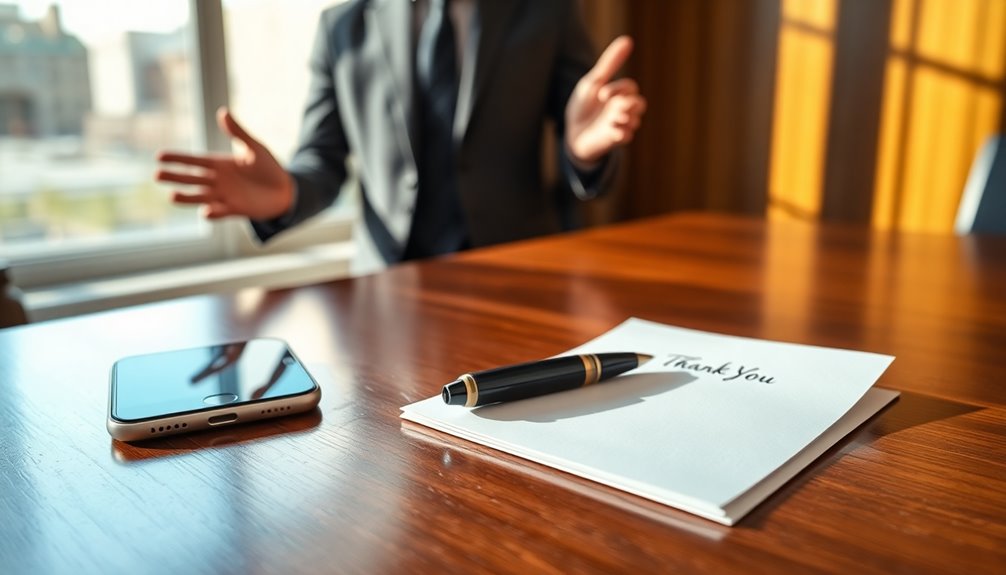
Following up after your final interview is an essential step that can set you apart from other candidates. A well-crafted thank-you email shows your appreciation and reinforces your interest in the position.
It's your chance to highlight key points from your conversation and reiterate how your skills align with the company's needs. This proactive approach not only demonstrates professionalism but also keeps you top-of-mind for the hiring team.
Remember, the follow-up is more than just politeness; it's a strategic move that can influence their decision. Make sure to keep your message concise, express gratitude, and maintain a positive tone.
Doing this effectively can strengthen your candidacy and leave a lasting impression on potential employers.
Frequently Asked Questions
What Should I Wear to a Final Interview?
When deciding what to wear to a final interview, aim for professional attire that aligns with the company culture.
You can't go wrong with a tailored suit, dress shirt, and polished shoes.
If the company leans more casual, smart business casual can work too, like slacks and a nice blouse or shirt.
Don't forget to pay attention to grooming—clean hair and minimal accessories can make a strong impression.
Confidence in your appearance matters!
How Long Does a Final Interview Usually Last?
A final interview usually lasts between 30 minutes to an hour.
It's your chance to engage with senior management and discuss your fit for the role. During this time, you'll likely answer questions about your experiences, skills, and how you align with the company culture.
Be prepared to ask your own questions too, as this shows your interest and helps you gauge if the company is right for you.
Who Will Be Present During the Final Interview?
During your final interview, you can expect to meet with senior management or an HR manager.
They'll assess your fit within the company and evaluate your potential for a long-term relationship. You might also interact with potential colleagues, which gives you a glimpse into the company culture.
This diverse presence is essential, as it helps both you and the interviewers gauge how well you align with the organization's values and dynamics.
Can I Ask Questions During the Final Interview?
Absolutely, you can ask questions during the final interview!
Imagine you're sitting across from the hiring manager, and after discussing your qualifications, you ask, "How does the team handle conflicts?" This shows your interest and helps you gauge the work environment.
Questions like this not only engage the interviewer but also demonstrate your proactive approach.
What Should I Do if I Don't Know an Answer?
If you don't know an answer during the interview, it's okay to admit it.
Stay calm and take a moment to think before responding. You can say something like, "That's a great question. I'm not sure about that specific detail, but I'd approach it by…"
This shows honesty and problem-solving skills.
Remember, interviewers appreciate genuine responses and your ability to handle uncertainty gracefully.
Always pivot to related experiences or knowledge you have.
Conclusion
As you prepare for your final interview, remember that this is your chance to truly connect with the company and showcase your unique fit. By anticipating key questions, effectively managing stress, and communicating confidently, you can leave a lasting impression. Don't underestimate the power of a thoughtful follow-up—could it be the final touch that sets you apart from other candidates? Embrace this opportunity, and you just might land your dream job!
Eugene brings a fresh, dynamic voice to our platform as one of our talented Writers. Specializing in research-driven content, he explores the latest findings in psychology and personal growth, translating them into actionable insights for our readers. Eugene’s work is fueled by a curiosity about what makes us tick and a desire to help others unlock their potential.

